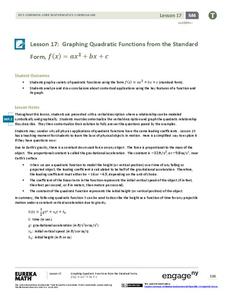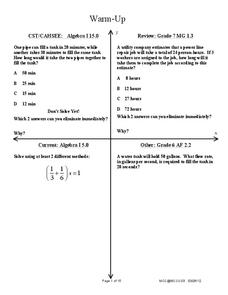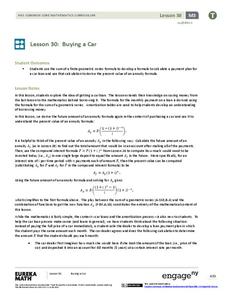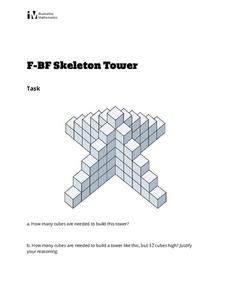EngageNY
Solving Inequalities
Do properties of equations hold true for inequalities? Teach solving inequalities through the theme of properties. Your class discovers that the multiplication property of equality doesn't hold true for inequalities when multiplying by a...
EngageNY
Why Do Banks Pay YOU to Provide Their Services?
How does a bank make money? That is the question at the based of a lesson that explores the methods banks use to calculate interest. Groups compare the linear simple interest pattern with the exponential compound interest pattern.
EngageNY
The Most Important Property of Logarithms
Won't the other properties be sad to learn that they're not the most important? The 11th installment of a 35-part module is essentially a continuation of the previous lesson, using logarithm tables to develop properties. Scholars...
EngageNY
Why Were Logarithms Developed?
Show your class how people calculated complex math problems in the old days. Scholars take a trip back to the days without calculators in the 15th installment of a 35-part module. They use logarithms to determine products of numbers and...
EngageNY
The Graph of the Natural Logarithm Function
If two is company and three's a crowd, then what's e? Scholars observe how changes in the base affect the graph of a logarithmic function. They then graph the natural logarithm function and learn that all logarithmic functions can be...
EngageNY
Graphing Quadratic Functions from the Standard Form
Use context to explain the importance of the key features of a graph. When context is introduced, the domain and range have meaning, which enhances understanding. Pupils use application questions to explore the key features of the graph...
EngageNY
Recursive Challenge Problem—The Double and Add 5 Game
Math is all fun and games! Use a game strategy to introduce the concept of sequences and their recursive formulas. The activity emphasizes notation and vocabulary.
West Contra Costa Unified School District
Work Problems – Bar Models
Why do we have to do so much work? Scholars learn how to set up bar models to represent a situation involving work. They use these bar models to help set up equations with rational coefficients to solve the problem situation.
EngageNY
Secant and the Co-Functions
Turn your class upside down as they explore the reciprocal functions. Scholars use the unit circle to develop the definition of the secant and cosecant functions. They analyze the domain, range, and end behavior of each function.
EngageNY
Types of Statistical Studies
All data is not created equal. Scholars examine the different types of studies and learn about the importance of randomization. They explore the meaning of causation and when it can be applied to data.
EngageNY
Building Logarithmic Tables
Thank goodness we have calculators to compute logarithms. Pupils use calculators to create logarithmic tables to estimate values and use these tables to discover patterns (properties). The second half of the instructional activity has...
EngageNY
Changing the Base
I can't calculate a base-2 logarithm since my calculator doesn't have a base-2 log key. Young mathematicians use the change of base formula to extend the properties of logarithms to all bases. Among these bases is the natural log base,...
EngageNY
Buying a Car
Future car owners use geometric sums to calculate payments for a car loan in the 31st installment of a 35-part module. These same concepts provide the basis for calculating annuity payments.
Mathematics Vision Project
Module 4: Polynomial Functions
Bridge the gap between graphical and algebraic representations. Learners complete six lessons that begin by pointing out connections between the key features of a polynomial graph and its algebraic function. Later, pupils use the...
Curated OER
Who Wants to Win Millions: Variables
Lead your class on an exploration of basic algebra using this resource. As part of a game, learners answer algebra questions involving addition, subtraction, multiplication, and division.
BW Walch
Creating Linear Equations in One Variable
The example of two travelers meeting somewhere along the road has been a stereotypical joke about algebra as long as algebra has existed. Here in this detailed presentation, this old trope gets a careful and approachable treatment....
Curated OER
Mixing Candies
Mixture problems are a classic in first-year algebra. Unfortunately, many learners approach them in a formulaic fashion and don't truly understand the meaning of the algebraic expressions they are using. Here, the questions are not the...
Curated OER
One-Variable Inequality Word Problems
Here is a great set of eight scenarios that require the writing of a one-variable inequality and then solving to find the solution. This inequality word problem activity is then followed by the solutions to each of the eight problems.
Illustrative Mathematics
Equal Area Triangles on the Same Base II
A deceptively simple question setup leads to a number of attack methods and a surprisingly sophisticated solution set in this open-ended problem. Young geometers of different strengths can go about defining the solutions graphically,...
Math Drills
Solving Quadratic Equations
Need a solving quadratic equations with factoring worksheet? Here it is! A page worth of problems all with a leading coefficient of 1 gives your class a beginners level approach to the topic.
Illustrative Mathematics
Introduction to Linear Functions
Introduce your algebra learners to linear and quadratic functions. Learners compare the differences and relate them back to the equations and graphs. Lead your class to discussions on the properties of a function or a constant slope...
Chapman University
A Pythagorean-Style Proof of the Sine Sum-of-Angles Formula
This well organized poster shows a step-by-step algebraic proof and related graphic. Understanding how formulas were derived, connects learners to the idea that the study of mathematics is continuous and cumulative. Learners will...
Curated OER
Solution Sets
Here is a task that gives the graph of the solutions of a system of linear inequalities and asks learners to analyze and write the algebraic form of the systems. By turning the problem around, learners make the connections between...
Curated OER
Skeleton Tower
Your algebra learners build a quadratic function in this task of counting the blocks used to build objects. The arithmetic sequence that shows up brings up a shortcut to the long addition using the Gauss Method. Eventually, learners...























